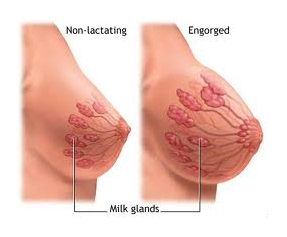How much milk is enough?
This is not an easy question to answer. Mostly, a baby gets all the milk it needs within the first ten minutes of feeding. Quite often a baby continues to be attached to a breast because it is comfortable or it is still getting a trickle of milk. It can also be asleep. However, if a baby is content it has had enough. The fact that a baby cries does not necessarily mean that it is hungry. A baby could be crying because of discomfort through a “wind” or because it is wet. One can also not tell about the quantity or quality of the milk from the fullness of the breasts or the appearance of the milk.  Breasts are normally firm and appear full for the first two weeks although the milk production is not adequate. Breasts then appear to be less full, due to the balance between demand and the production of milk, although the production of milk has increased.
Breasts are normally firm and appear full for the first two weeks although the milk production is not adequate. Breasts then appear to be less full, due to the balance between demand and the production of milk, although the production of milk has increased.
The most telling way of determining if there is sufficient milk is to observe the baby. If it is gaining weight, happy and contented, it is reasonable to conclude that the baby is being well fed. The weight of the baby must be checked as well. This should be done every few days and not after every few feeds. The most important way for a mother to ensure that her baby is getting enough milk is to be relaxed and not to be stressed. Excessive stress can actually reduce the quantity of milk being supplied. Breastfeeding is an activity that has occurred since time immemorial without scales and other measurements and it is almost impossible to feed your baby too much. Mother Nature is quite wonderful and will look after your baby more than adequately without you stressing over it.
What about the quality of breast milk?
In general, it may be stated that the quality of a mother’s milk is not altered by what she eats or drinks, provided that she has a normal balanced diet. Accordingly, the quality of a mother’s milk will be high and will not alter due to her diet. This means that a lactating mother can eat and drink (even alcohol in moderation) most things. Certain drugs, including antibiotics, can and do pass into breast milk. The amount normally will be small and will neither benefit nor harm the baby. There are, however, a few drugs that. can cause harm to a baby. Amongst these will be anti-coagulants (to relieve blood clots), anti-thyroid drugs, certain laxatives, lithium and certain drugs to treat epilepsy. In the event that any of these drugs have been prescribed to you, query it with your gynaecologist or doctor.
[email_link]